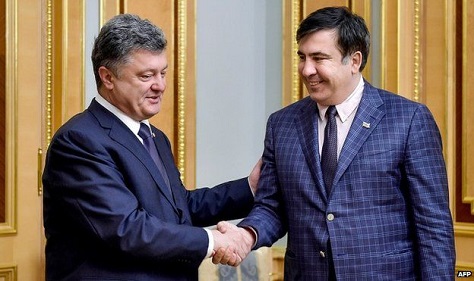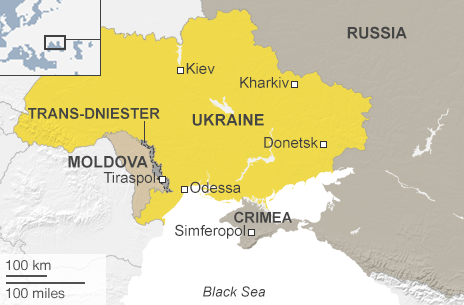The last we’d heard of former Georgian president Mikheil Saakashvili, he was enjoying a hipster lifestyle in Williamsburg. ![]()
![]()
Increasingly, though, Saakashvili has become a persona non grata in Georgia, where he held power between 2004 and 2013, ushering in liberal reforms to a country sorely in need of liberalization. When an umbrella coalition of opponents, led and financed by Bidzina Ivanishvili defeated his ruling party in late 2013, Saakashvili recognized the loss and facilitated the ensuing political transition, which coincided with the constitutional change from a strong presidential system to a parliamentary system.
So it was quite a surprise to see Saakashvili emerge last weekend in Saturday as the newly minted governor of the Odessa region.
We live in an era where Stanley Fischer can obtain Israeli citizenship, lead its central bank and then return to the United States to become vice chair of the Federal Reserve — or where Mark Carney can switch roles from heading the Bank of Canada to the Bank of England. So why shouldn’t a well-regarded former president be permitted, especially at the young age of 47, to take on a politically difficult role in a nearby country — especially when the struggles facing Georgia and Ukraine are so similar?
In order to assume the role as Odessa’s new governor, Saakashvili was obligated to give up his Georgian citizenship and accept from Ukrainian president Petro Poroshenko an offer of Ukrainian citizenship. Saakashvili previously refused to do so when Poroshenko earlier offered him a position as deputy prime minister.
A post-presidential exile from Georgia
As Saakashvili himself has noted, however, Georgian citizenship entitles him to little more than six square meters in prison. That’s because the current government has charged Saakashvili with multiple offenses, all of which seem precariously motivated by politics, not the rule of law. Russian prime minister Dmitry Medvedev called the announcement a ‘circus,’ but the reaction from Georgia’s current leadership was even more incendiary. Tina Khidasheli, the country’s defense minister, attached Saakashvili for treason, and the country’s president, Giorgi Margvelashvili, called the move an ‘insult’ to Georgia and its government.
The step could complicate Saakashvili’s plans to lead the opposition in the 2016 parliamentary elections in Georgia or compete for the presidency in 2018.
As president, there’s no doubt that Saakashvili reduced corruption and improved the underlying Georgian economy and, in stepping down with grace, established a strong precedent for democratic transition and the rule of law. His largest miscalculation came in 2007 and 2008, when he escalated military and diplomatic tensions with Russia. With high hopes for NATO and European Union membership, and believing Western forces would ultimately come to his aid, Saakashvili’s clash with the Russian military led to the quasi-annexation of two breakaway republics — Abkhazia and South Ossetia. Many of the current government’s criminal charges against Saakashvili today spring from the debacle.
Ivanishvili stepped aside as prime minister in November 2013, handing over the reins to Irakli Garibashvili, a 32-year-old who served as interior minister. Ivanishvili’s governing coalition, Georgian Dream (ქართული ოცნება), which came into existence three years ago united by its desire to defeat Saakashvili, has increasingly struggled to form a coherent policy perspective. Garibashvili, for example, unceremoniously fired his high-flying, well-regarded defense minister Irakly Alasania amid worries that his government was turning away from its pro-Western sensibilities.
Odessa, sympathetic to Russia, could become a Black Sea target linking Crimea and Moldova’s Transnistria
Meanwhile, Ukraine is still struggling with the aftermath of last year’s dramatic political and civic upheavals, including the abdication of pro-Russian president Viktor Yanukovych and Russia’s annexation of the Crimean peninsula. Despite Poroshenko’s easy election to the presidency last May, he has little to show for his first year in office. Ukraine’s economy lies in tatters, and much of eastern Ukraine remains suspended in a pro-Russia, separatist uprising.
Odessa, an important region that lies just across the Black Sea from Crimea and abuts some of the most pro-Russian areas of Moldova, is the hub of Ukraine’s energy refining industry and an important seaport linking the country to the rest of the world.
The oblast, home to 2.4 million Ukrainians, is somewhat unique in that while it’s predominantly ethnic Ukrainian, more people are native Russian-speakers. In the great political divide between the ‘pro-Western’ west and the ‘pro-Russian’ east, Odessa is the westernmost point of the pro-Russian heartland. Poroshenko won just 41.8% of the vote in Odessa, about 13% less than his national average. Yanukovych won with 51.1% here in 2010, a much wider majority than his national average. Odessa was none too fond of Ukraine’s ‘Orange Revolution’ either — in the December 2004 runoff, Yanukvoych won 66.6% of the vote to just 27.5% for national winner Viktor Yushchenko.
That’s caused increasing worries that Russia is determined to enhance its influence over Odessa, given that it lies within the boundaries of Russian president Vladimir Putin’s concept of ‘Novorossiya’ — the broader Russian-speaking world.
Poroshenko has longstanding ties to Russian business and though his relationship with Putin is complex, it couldn’t be worse than relations between Putin and Saakashvili. Nevertheless, there are undeniable similarities uniting Ukraine and Georgia. Both enjoyed ruptures with corrupt and authoritarian governments — Ukraine’s 2004 ‘Orange Revolution’ and the 2004 ‘Rose Revolution’ in Georgia that brought Saakashvili to power. The two countries are among the most enthusiastic former Soviet states about long-term accession into the European Union. Both have suffered from Russian territorial aggression and annexation over the past decade. And neither have been fully satisfied with the level of support, economic and politically, they have received from the United States and Europe.
Saakashvili’s international profile, however, will bring credibility to his task in Odessa, sidelining Ukrainian oligarch Igor Kolomoyskyi and eliminating corruption much the same way he did in Georgia over the last decade. Odessa, in particular, has been impervious to reform, and it’s one of the country’s most under-performing regions. Given the antagonism that Saakashvili inspires in Moscow, however, there’s a risk that his appointment as governor will draw additional Russian pressure in the region. If that happens, a Russia-controlled Odessa would enhance Russian dominance in the Black Sea and provide a geographic nexis for pro-Russian Moldovans living in Transnistria.

